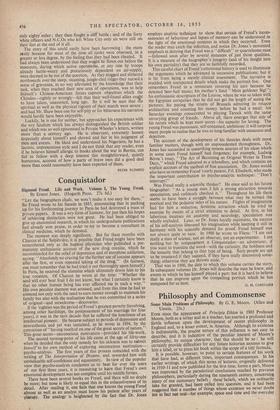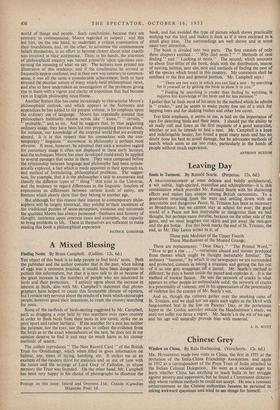Philosophy and Commonsense
Some Main Problems of Philosophy. By G.'E. Moore. (Allen and Unwin. 25s.)
EVER since the appearance of Principia Ethica in 1903 Professor Moore, both as a writer and as a teacher, has exerted a profound and fertile influence upon the development of recent philosophy in England and, to a lesser extent, in America. Although its existence is indisputable, the precise nature of this influence is not easy to describe, and it is indicative of the peculiar interest of Moore's philosophy, its unique character, that this should be so : he will certainly provide difficulties for any future historian anxious to give him a label, or to press his book within the scope of a tidy formula.
It is possible, however, to point to certain features of his work that have had, at different times, important consequences. In his earlier writings, of which this series of lectures, originally delivered in 1910-11 and now published for the first time, forms a part, Moore was impressed by the paradoxical conclusions reached by previous philosophers, particulatly during the nineteenth century, concerning many of our customary beliefs ; these' beliefs, which we ordinarily take for granted, had been called into question, and it had been suggested that a number of things whose existence we never doubt are in fact net real—for example, space and time and the everyday world of things and people. Such conclusions, because they are contrary to commonsense, Moore regarded as suspect ; and this led him, on the one hand, to undertake a critical examination of their foundations, and, on the other, to scrutinise the commonsense beliefs themselves, in an effort to become clearer about what exactly was involved in their acceptance. Thus, in his hands, the attention of philosophical enquiry was turned primarily upon questions con- cerning the meaning of what we say. The lectures now printed are illustrative of this tendency, and if the conclusions he arrived at frequently appear confused, and in their own way contrary to common- sense, it was all the same a considerable achievement, both to have stressed the peculiar nature of many widely-held philosophical views, and also to have undertaken an investigation of the problems giving rise to them with a vigour and clarity of exposition that had become rare in English philosophy since Hume.
Another feature that has come increasingly to characterise Moore's philosophical outlook, and which appears in the footnotes and appendices he has added to the present volume, is his emphasis, upon the ordinary use of language. Moore has repeatedly insisted that philosophers habitually misuse words like " know," " certain," probable," and so on. And he suggests that, by thus neglecting ordinary usage, they have been led into propounding theories about, for instance, our knowledge of the external world that are evidently absurd. It is in this respect that his connection with the con- temporary " linguistic " movement in philosophy is perhaps most obvious. It must, however, be admitted that such a sensitive regard for customary usage is often not displayed in these early lectures, and the techniques Moore has since developed could easily be applied to several passages that occur in them. They were composed before the relationship between language and philosophy had been system- atically explored, a fact which is made apparent in their approach to, and method of formulating, philosophical problems. The sugges-' tion, for example, that it is the philosopher's task to enumerate and classify the different types of " thing " that exist in the Universe, and the tendency to regard differences in the linguistic function of expressions as differences between various kinds of entity, are features which clearly show that they belong to another age.
But although for this reason their interest to contemporary philo- sophers will be largely historical, they exhibit in'their treatment of the traditional puzzles of sense-perception, existence and universals the qualities Moore has always possessed—freshness and honesty of -thought, insistence upon concrete cases and examples, the capacity to bring problems to life. These in themselves are sufficient to make- reading this book a philosophical experience.
PATRICK GARDINER



































 Previous page
Previous page